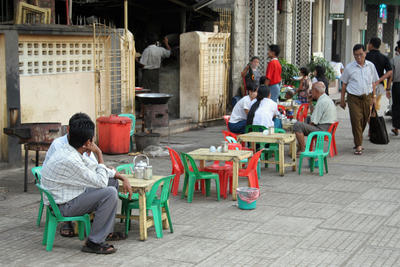Corruption in Burma is not only a major problem for the country’s second round of reforms, but also threatens the country’s economic development and growth. It can be seen at all levels of government — from the national government and national institutions down to the regional and local levels. Today, Burma is continually ranked as one of the mostcorrupt countries in the world in line with Somalia and Afghanistan.
Burma has a notorious ‘tea money’ culture, and the lack of independent civilian institutions undermine the rule of law, good governance and the overall integrity of the state. The Thein Sein administration has occasionally called for better governance and more anti-corruption mechanisms, but words are not enough — concrete action is needed. Not only does Burma need to introduce anti-corruption laws, it also needs an independent anti-corruption watchdog. Public institutions, as well as the business community, need to change their perception of corruption and make clear to the government that corruption can no longer be tolerated. The culture of tea money must be perceived as not only a moral wrong but a serious crime with deeply harmful effects on the wider public. It severely impacts on Burma’s economic development, as it deters international investors from investing in the Burmese market for fear of having their investment be smirched by corrupt Burmese officials.
Corruption in Burma not only affects good governance but underpins economic distortion. For example, there is no transparent fiscal administrative mechanism and public financial management system in place. No one apart from high-ranking government officials knows how much public revenue Burma collects. And there are countless allegations of corruption by public officials. Both cabinet ministers and high-ranking officials, particularly those in departments regulating mining, oil and gas, are continuously suspected of transferring public revenue to their private overseas bank accounts. Ministers and senior public officials in departments that regulate Burma’s resource sectors are notoriously corrupt, as the lack of transparent licensing systems and public reporting mechanisms contribute to the spread of corruption in these ministries.
There are a number of steps Burma can take to strengthen its fight against corruption.
First, with respect to the systemic corruption in the mining and resource industries, licensing mechanisms and auction procedures should be established and made known to the public.
Second, public debate and participation should be encouraged in both the government’s law-making and decision-making processes. One way to achieve this is by introducing freedom of information laws. While the Central Statistical Organisation occasionally provides some country information to donors and multinational agencies, the people of Burma are unable to access government documents detailing public revenue, expenditures and government procurement, as the Thein Sein administration has not yet made these documents publicly available. Without a public reporting system and freedom of information laws, corruption in Burma will remain widespread and the country will continue to be ranked as one of the world’s most corrupt states.
Third, Burma needs to establish credible anti-corruption mechanisms. The Thein Sein administration recently announced it is willing to join the Extractive Industries Transparency Initiative (EITI), a voluntary, global initiative that compels the government to publicly disclose profits made by the mining and resource sector. But the general public does not see the EITI as a credible authority on anti-corruption. Incredibly, rather than appointing civilian or independent members to the EITI Leading Authority, a high-level committee responsible for overseeing the EITI’s implementation, President Thein Sein appointed former military generals who were once on the EU and the US blacklist.
Three years after President U Thein Sein discussed the idea of ‘second-reforms’, his administration must declare war against corruption at every institutional level of the society to have a chance of succeeding in his reform plans.
Naing Ko Ko is a Visiting Scholar at Regulatory Institutions Network (RegNet), the Australian National University. This article does not reflect the policy of RegNet and the university.


How can U Thein Sein and his administration even begin to “declare war against corruption” when they are themselves corrupt? It’s rather futile is it not?
Peter Vertannes
The Thein Sein government is as hopeless as the previous satanic regimes. It will certainly take a long time for the deep-rooted mass corruption to be rooted out from the country even when a democratically elected government is installed. Salaries are too low for all state employees to survive. There are some anti-corruption laws but they lack teeth. Thein Sein is obviously a puppet for Than Shwe still pulling the strings. Cronyism, corruption and clientelism – the 3Cs – rule and will continue to rule.